- Home
- Carey Rockwell
Tom Corbett Space Cadet Page 2
Tom Corbett Space Cadet Read online
Page 2
Astro and Tom immediately began to pile Manning's luggage to one side of the slidestairs.
"Take your luggage with you, Misters!" snapped Herbert.
"It isn't ours," replied Tom.
"Isn't yours?" Herbert glanced over the pile of suitcases and turned back to Tom. "Whose is it then?"
"Belongs to Cadet Candidate Roger Manning," replied Tom.
"What are you doing with it?"
"We were carrying it for him."
"Do we have a candidate in the group who finds it necessary to provide himself with valet service?"
Herbert moved along the line of boys.
"Will Cadet Candidate Roger Manning please step forward?"
Roger slid from behind a group of boys to face the senior cadet's cold stare.
"Roger Manning here," he presented himself smoothly.
"Is that your luggage?" Herbert jerked his thumb over his shoulder.
"It is."
Roger smiled confidently, but Herbert merely stared coldly.
"You have a peculiar attitude for a candidate, Manning."
"Is there a prescribed attitude, Mr. Herbert?" Roger asked, his smile broadening. "If there is, I'll be only too glad to conform to it."
Herbert's face twitched almost imperceptibly. Then he nodded, made a notation on a pad and returned to his post at the head of the gaping line of boys. "From now on, Candidate Manning, you will be responsible for your own belongings."
Tom, Astro, and Philip Morgan stepped on the slidestairs and began their spiraling ascent to the forty-second floor.
"I saw what happened at the monorail station," drawled the third member of Section 42-D, leaning against the bannister of the moving belt. "By the craters of Luna, that Manning felluh sure is a hot operator."
"We found out for ourselves," grunted Astro.
"Say, since we're all bunkin' togethuh, let's get to knowin' each othuh. My name's Phil Morgan, come from Georgia. Where you all from?"
"New Chicago," replied Tom. "Name's Tom Corbett. And this is Astro."
"Hiya." Astro stuck out a big paw and grinned his wide grin. "I guess you heard. Astro's all the name I've got."
"How come?" inquired the Southerner.
"I'm from Venus and it's a custom from way back when Venus was first colonized to just hand out one name."
"Funny custom," drawled Phil.
Astro started to say something and then stopped, clamping his lips together. Tom could see his face turn a slow pink. Phil saw it too, and hastily added:
"Oh—I didn't mean anything. I—ah—" he broke off, embarrassed.
"Forget it, Phil." Astro grinned again.
"Say," interjected Tom. "Look at that!"
They all turned to look at the floor they were passing. Near the edge of the step-off platform on the fourth floor was an oaken panel, inscribed with silver lettering in relief. As they drew even with the plaque, they caught sight of someone behind them. They turned to see Manning, the pile of suitcases in front of him, reading aloud.
"… to the brave men who sacrificed their lives in the conquest of space, this Galaxy Hall is dedicated…"
"Say, this must be the museum," said Tom. "Here's where they have all the original gear used in the first space hops."
"Absolutely right," said Manning with a smile.
"I wonder if we could get off and take a look?" Astro asked.
"Sure you can," said Roger. "In fact, the Academy regs say every cadet must inspect the exhibits in the space museum within the first week."
The members of Section 42-D looked at Roger questioningly.
"I don't know if we have time." Tom was dubious.
"Sure you have—plenty. I'd hop off and take a look myself but I've got to get this junk ready to ship home." He indicated the pile of bags in front of him.
"Aw, come on, Tom, let's take a look!" urged Astro. "They have the old Space Queen in here, the first ship to clear Earth's gravity. Boy, I'd sure like to see her!" Without waiting for the others to agree, the huge candidate stepped off the slidestairs.
"Hey, Astro!" yelled Tom. "Wait! I don't think—" His voice trailed off as the moving stair carried him up to the next floor.
But then a curious thing happened. As other boys came abreast of the museum floor and saw Astro they began to get off and follow him, wandering around gazing at the relics of the past.
Soon nearly half of the cadet candidates were standing in silent awe in front of the battered hull of the Space Queen, the first atomic-powered rocket ship allowed on exhibition only fifty years before because of the deadly radioactivity in her hull, created when a lead baffle melted in midspace and flooded the ship with murderous gamma rays.
They stood in front of the spaceship and listened while Astro, in a hushed voice, read the inscription on the bronze tablet.
"—Earth to Luna and return. 7th March 2051. In honor of the brave men of the first atomic-powered spaceship to land successfully on the planet Moon, only to perish on return to Earth…"
"Candidates—staaaaaaaaannnnnd too!"
Like a clap of thunder Warrant Officer McKenny's voice jarred the boys out of their silence. He stepped forward like a bantam rooster and faced the startled group of boys.
"I wanna know just one thing! Who stepped off that slidestairs first?"
The boys all hesitated.
"I guess I was the first, sir," said Astro, stepping forward.
"Oh, you guess you were, eh?" roared McKenny.
Taking a deep breath McKenny launched into a blistering tirade. His choice of words were to be long remembered by the group and repeated to succeeding classes. Storming against the huge Venusian like a pygmy attacking an elephant, McKenny roared, berated and blasted.
Later, when Astro finally reached his quarters and changed into the green coveralls of the cadet candidates, Tom and Phil crowded around him.
"It was Roger, blast him!" said Tom angrily. "He was getting back at you because Cadet Herbert made him carry his own gear."
"I asked for it," grumbled Astro. "Ah, I should've known better. But I just couldn't wait to see the Queen." He balled his huge hands into tight knots and stared at the floor.
"Now hear this!!!"
A voice suddenly rasped over the PA system loud-speaker above the door. "All cadet candidates will come to attention to receive the Space Academy oath from Commander Walters." The voice paused. "AT-TENT-SHUN! Cadet candidates—Staaaaannnnd TO!"
"This is Commander Walters speaking!" A deep, powerful voice purred through the speaker. "The Academy oath is taken individually.
"It is something each candidate locks in his spirit, his mind and his heart. That is why it is taken in your quarters. The oath is not a show of color, it is a way of life. Each candidate will face as closely as possible in the direction of his home and swear by his own individual God as he repeats after me."
Astro stepped quickly to the window port and gazed into the blue heavens, eyes searching out the misty planet Venus. Phil Morgan thought a moment, and faced toward the wall with the inlaid star chart of the sky, thinking of sun-bathed Georgia. Tom Corbett stared straight at a blank wall.
Each boy did not see what was in front of him yet he saw further, perhaps, than he had ever seen before. He looked into a future which held the limitlessness of the universe and new worlds and planets to be lifted out of the oblivion of uncharted depths of space to come.
They repeated slowly…
"… I solemnly swear to uphold the Constitution of the Solar Alliance, to obey interplanetary law, to protect the liberties of the planets, to safeguard the freedom of space and to uphold the cause of peace throughout the universe… to this end, I dedicate my life!"
CHAPTER 2
Tom Corbett's first day at Space Academy began at 0530 hours with the blaring of the Cadet Corps Song over the central communicators:
"From the rocket fields of the Academy
To the far-flung stars of outer space,
We're Space Cadets trai
ning to be
Ready for dangers we may face.
Up in the sky, rocketing past
Higher than high, faster than fast,
Out into space, into the sun
Look at her go when we give her the gun.
From the rocket fields of the…"
Within sixty seconds, the buildings of the Academy rocked with the impact of three thousand voices singing the last stanza. Lights flashed on in every window. Cadets raced through the halls and across the quadrangle. The central communicator began the incessant mustering of cadets, and the never-ending orders of the day.
"… Unit 38-Z report to Captain Edwards for astrogation. Unit 68-E report to Commander Walters for special assignments."
On and on, down the list of senior cadets, watch officers, and the newly arrived Earthworms. Units and individuals to report for training or study in everything from ground assembly of an atomic rocket motor, to the history of the founding of the Solar Alliance, the governing body of the tri-planet civilization.
Tom Corbett stepped out of the shower in Section 42-D and bellowed at the top of his voice.
"Hit the deck, Astro! Make use of the gravity!" He tugged at an outsized foot dangling over the side of an upper bunk.
"Uhhhh-ahhhh-hummmmm," groaned the cadet from Venus and tried to go back to sleep.
Philip Morgan stepped into the shower, turned on the cold water, screeched at the top of his voice, gradually trailing off into countless repetitions of the last verse of the Academy song.
"Damp your tubes, you blasted space monkey," roared Astro, sitting up bleary-eyed.
"What time do we eat?" asked Tom, pulling on the green one-piece coverall of the Earthworm cadet candidates.
"I don't know," replied Astro, opening his mouth in a cavernous yawn. "But it'd better be soon. I like space, but not between my backbone and my stomach!"
Warrant Officer McKenny burst into the room and began to compete with the rest of the noise outside the buildings.
"Five minutes to the dining hall and you'd better not be late! Take the slidestairs down to the twenty-eighth floor. Tell the mess cadet in charge of the hall your unit number and he'll show you to the right table. Remember where it is, because you'll have to find it yourself after that, or not eat. Finish your breakfast and report to the ninety-ninth floor to Dr. Dale at seven hundred hours!"
And as fast as he had arrived, he was gone, a flash of red color with rasping voice trailing behind.
Exactly one hour and ten minutes later, promptly at seven o'clock, the three members of Unit 42-D stood at attention in front of Dr. Joan Dale, along with the rest of the green-clad cadets.
When the catcalls and wolf whistles had died away, Dr. Dale, pretty, trim, and dressed in the gold and black uniform of the Solar Guard, held up her hand and motioned for the cadets to sit down.
"My answer to your—" she paused, smiled and continued, "your enthusiastic welcome is simply—thank you. But we'll have no further repetitions. This is Space Academy—not a primary school!"
Turning abruptly, she stood beside a round desk in the well of an amphitheater, and held up a thin tube about an inch in diameter and twelve inches long.
"We will now begin your classification tests," she said. "You will receive one of these tubes. Inside, you will find four sheets of paper. You are to answer all the questions on each paper and place them back in the tube. Take the tube and drop it in the green outline slot in this wall."
She indicated a four-inch-round hole to her left, outlined with green paint. Beside it, was another slot outlined with red paint. "Remain there until the tube is returned to you in the red slot. Take it back to your desk." She paused and glanced down at her desk.
"Now, there are four possible classifications for a cadet. Control-deck officer, which includes leadership and command. Astrogation officer, which includes radar and communications. And power-deck officer for engine-room operations. The fourth classification is for advanced scientific study here at the Academy. Your papers are studied by an electronic calculator that has proven infallible. You must make at least a passing grade on each of the four classifications."
Dr. Dale looked up at the rows of upturned, unsmiling faces and stepped from the dais, coming to a halt near the first desk.
"I know that all of you here have your hearts set on becoming spacemen, officers in the Solar Guard. Most of you want to be space pilots. But there must be astrogators, radar engineers, communication officers and power-deck operators on each ship, and," she paused, braced her shoulders and added, "some of you will not be accepted for any of these. Some of you will wash out."
Dr. Dale turned her back on the cadets, not wanting to look at the sudden pallor that washed over their faces. It was brutal, she thought, this test. Why bring them all the way to the Academy and then give the tests? Why not start the entrance exams at the beginning with the classification and aptitude? But she knew the answer even before the thoughtful question was completed. Under the fear of being washed out, the weaker ones would not pass. The Solar Guard could not afford to have cadets and later Solar Guard officers who could not function under pressure.
She began handing out the tubes and, one by one, the green-clad candidates stepped to the front of the room to receive them.
"Excuse me, Ma'am," said one cadet falteringly. "If—if—I wash out as a cadet—as a Solar Guard officer cadet"—he gulped several times—"does that mean there isn't any chance of becoming a spaceman?"
"No," she answered kindly. "You can become a member of the enlisted Solar Guard, if you can pass the acceleration tests."
"Thank you, Ma'am," replied the boy and turned away nervously.
Tom Corbett accepted the tube and hurried back to his seat. He knew that this was the last hurdle. He did not know that the papers had been prepared individually, the tests given on the basis of the entrance exams he had taken back at New Chicago Primary Space School.
He opened the tube, pulling out the four sheets, printed on both sides of the paper, and read the heading on the first: ASTROGATION, COMMUNICATIONS, SIGNALS (Radar)
He studied the first question.
"… What is the range of the Mark Nine radar-scope, and how far can a spaceship be successfully distinguished from other objects in space?…"
He read the question four times, then pulled out a pencil and began to write.
Only the rustle of the papers, or the occasional sigh of a cadet over a problem, disturbed the silence in the high-ceilinged room, as the hundred-odd cadets fought the questions.
There was a sudden stir in the room and Tom looked up to see Roger Manning walk to the slot and casually deposit his tube in the green-bordered slot. Then he leaned idly against the wall waiting for it to be returned. As he stood there, he spoke to Dr. Dale, who smiled and replied. There was something about his attitude that made Tom boil. So fast? He glanced at his own papers. He had hardly finished two sheets and thought he was doing fine. He clenched his teeth and bent over the paper again, redoubling his efforts to triangulate a fix on Regulus by using dead reckoning as a basis for his computations.
Suddenly a tall man, wearing the uniform of a Solar Guard officer, appeared in the back of the room. As Dr. Dale looked up and smiled a greeting, he placed his finger on his lips. Steve Strong, Captain in the Solar Guard, gazed around the room at the backs bent over busy pencils. He did not smile, remembering how, only fifteen years before, he had gone through the same torture, racking his brains trying to adjust the measurements of a magnascope prism. He was joined by a thin handsome young man, Lieutenant Judson Saminsky, and finally, Warrant Officer McKenny. They nodded silently in greeting. It would be over soon. Strong glanced at the clock over the desk. Another ten minutes to go.
The line of boys at the slots grew until more than twenty stood there, each waiting patiently, nervously, for his turn to drop the tube in the slot and receive in return the sealed cylinder that held his fate.
Still at his desk, his face wet with sweat, Ast
ro looked at the question in front of him for the fifteenth time.
"… Estimate the time it would take a 300-ton rocket ship with half-filled tanks, cruising at the most economical speed to make a trip from Titan to Venusport. (a) Estimate size and maximum capacity of fuel tanks. (b) Give estimate of speed ship would utilize…"
He thought. He slumped in his chair. He stared at the ceiling. He chewed his pencil…
Five seats away, Tom stacked his examination sheets neatly, twisted them into a cylinder and inserted them in the tube. As he passed the line of desks and headed for the slot, a hand caught his arm. Tom turned to see Roger Manning grinning at him.
"Worried, spaceboy?" asked Roger easily. Tom didn't answer. He simply withdrew his arm.
"You know," said Roger, "you're really a nice kid. It's a shame you won't make it. But the rules specifically say 'no cabbageheads.'"
"No talking!" Dr. Dale called sharply from her desk.
Tom walked away and stood in the line at the slots. He found himself wanting to pass more than anything in the world. "Please," he breathed, "please, just let me pass—"
A soft gong began to sound. Dr. Dale stood up.
"Time's up," she announced. "Please put your papers in the tubes and drop them in the slot."
Tom turned to see Astro stuffing his papers in the thin cylinder disgustedly. Phil Morgan came up and stood in back of Tom. His face was flushed.
"Everything O.K., Phil?" inquired Tom.
"Easy as free falling in space," replied the other cadet, his soft Georgian drawl full of confidence. "How about you?"
"I'm just hoping against hope."
The few remaining stragglers hurried up to the line.
"Think Astro'll make it?" asked Phil.
"I don't know," answered Tom, "I saw him sweating over there like a man facing death."
"I guess he is—in a way."
Astro took his place in line and shrugged his shoulders when Tom leaned forward to give him a questioning look.
"Go ahead, Tom," urged Phil. Tom turned and dropped his tube into the green-bordered slot and waited. He stared straight at the wall in front of him, hardly daring to breathe. Presently, the tube was returned in the red slot. He took it, turned it over in his hands and walked slowly back to his desk.

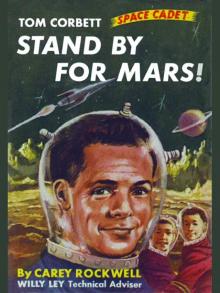 Stand by for Mars!
Stand by for Mars!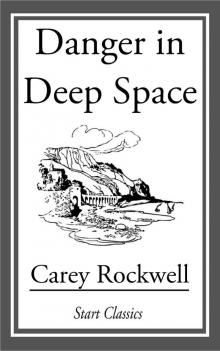 Danger in Deep Space
Danger in Deep Space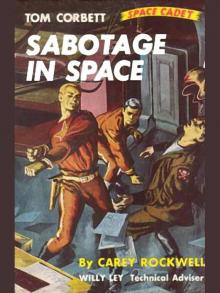 Sabotage in Space
Sabotage in Space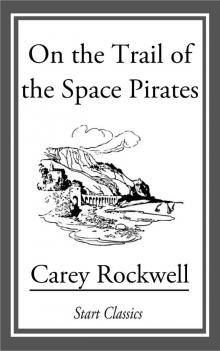 On the Trail of the Space Pirates
On the Trail of the Space Pirates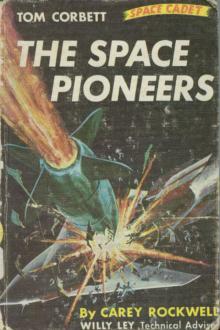 The Space Pioneers
The Space Pioneers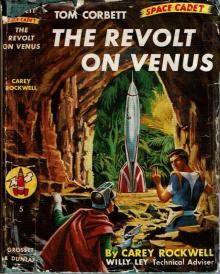 The Revolt on Venus
The Revolt on Venus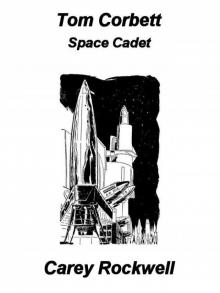 Tom Corbett Space Cadet
Tom Corbett Space Cadet